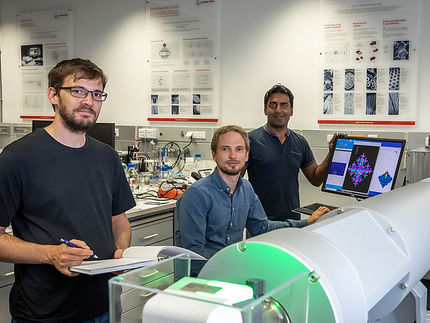EU project on sustainable batteries
BAM develops new measuring methods for safe batteries
Advertisement
The Federal Institute for Materials Research and Testing (BAM) is participating in a major European project to develop new measurement methods for sustainable battery materials. The aim is to fundamentally improve the characterization of batteries and thus accelerate the development of environmentally friendly energy storage systems.
The European battery industry is facing major challenges: An increasing demand for electrical energy storage meets limited resources and environmental pollution due to production and disposal. New battery technologies such as sodium-ion systems or low-cobalt lithium-ion cells are regarded as promising alternatives - but have so far been difficult to characterize, as they are based on complex and so far less researched material systems.
Hybrid measurement methods for the battery of the future
The "Hybrid Metrology for Sustainable and Low-Carbon Footprint Battery Materials" (HyMetBat) project aims to develop innovative hybrid metrology: several independent measurement methods - such as X-ray spectroscopy, Raman spectroscopy, calorimetry and impedance spectroscopy - are to be combined in order to analyze battery materials under realistic operating conditions ("in-situ").
In particular, BAM is developing a method with which the structural and electrochemical properties of these materials can be precisely correlated and is working closely with the Helmholtz-Zentrum Berlin (HZB), the University of La Sapienza in Rome, the University of Kent and the National Physics Laboratory in the UK. "We are particularly interested in analyzing special anode materials whose storage capacity varies greatly for reasons that are still unknown today. We want to quantify the performance limits of these materials in safe operation. We will also use the findings in the Berlin Battery Lab (BBL) recently founded with HZB and Humboldt University Berlin," explains Tim-Patrick Fellinger, Head of the BAM Electrochemical Energy Materials Department.
Scientific progress and industrial application
The measurement methods developed in the project will not only advance research, but will also be incorporated into international standards and transferred directly into industrial practice. This includes case studies with car manufacturers, battery producers and recycling companies. BAM is working closely with partners such as the MEET Battery Research Center in Münster.
HyMetBat is a project in the European research program "European Partnership on Metrology" under "Horizon Europe" and is funded by the EU with around 3.5 million euros. It brings together around 30 partner institutions from twelve countries. It is coordinated by the Physikalisch-Technische Bundesanstalt (PTB).
Note: This article has been translated using a computer system without human intervention. LUMITOS offers these automatic translations to present a wider range of current news. Since this article has been translated with automatic translation, it is possible that it contains errors in vocabulary, syntax or grammar. The original article in German can be found here.
Most read news
Other news from the department science

Get the chemical industry in your inbox
By submitting this form you agree that LUMITOS AG will send you the newsletter(s) selected above by email. Your data will not be passed on to third parties. Your data will be stored and processed in accordance with our data protection regulations. LUMITOS may contact you by email for the purpose of advertising or market and opinion surveys. You can revoke your consent at any time without giving reasons to LUMITOS AG, Ernst-Augustin-Str. 2, 12489 Berlin, Germany or by e-mail at revoke@lumitos.com with effect for the future. In addition, each email contains a link to unsubscribe from the corresponding newsletter.
Most read news
More news from our other portals
See the theme worlds for related content
Topic World Battery Technology
The topic world Battery Technology combines relevant knowledge in a unique way. Here you will find everything about suppliers and their products, webinars, white papers, catalogs and brochures.

Topic World Battery Technology
The topic world Battery Technology combines relevant knowledge in a unique way. Here you will find everything about suppliers and their products, webinars, white papers, catalogs and brochures.
Topic World Spectroscopy
Investigation with spectroscopy gives us unique insights into the composition and structure of materials. From UV-Vis spectroscopy to infrared and Raman spectroscopy to fluorescence and atomic absorption spectroscopy, spectroscopy offers us a wide range of analytical techniques to precisely characterize substances. Immerse yourself in the fascinating world of spectroscopy!

Topic World Spectroscopy
Investigation with spectroscopy gives us unique insights into the composition and structure of materials. From UV-Vis spectroscopy to infrared and Raman spectroscopy to fluorescence and atomic absorption spectroscopy, spectroscopy offers us a wide range of analytical techniques to precisely characterize substances. Immerse yourself in the fascinating world of spectroscopy!




























































